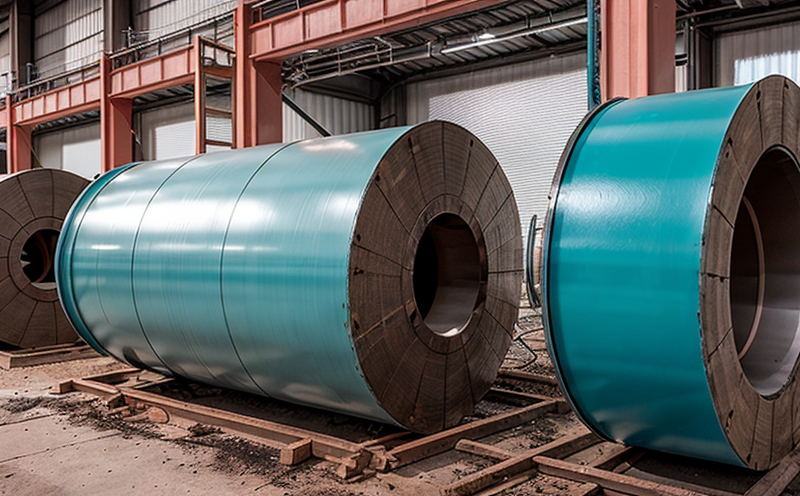ASTM D2794 Impact Resistance Durability Testing
The ASTM D2794 standard is a critical tool in evaluating the impact resistance and durability of materials used in industrial manufacturing. This test assesses how well a material can withstand sudden, significant impacts while maintaining its structural integrity over time. Industries ranging from automotive to construction heavily rely on this metric to ensure that components and structures are capable of withstanding operational stress without failure.
The ASTM D2794 test is particularly relevant for materials subjected to dynamic loading conditions such as those found in high-impact environments like power plants, aerospace, and heavy machinery. The testing procedure involves subjecting the material sample to a specified impact using a pendulum hammer, followed by observation of any deformation or fracture.
The primary focus of ASTM D2794 is on the mechanical properties of materials under dynamic loading conditions. This test is essential for ensuring that components and structures can maintain their integrity during sudden impacts, which could be critical in preventing catastrophic failures. The testing process involves precise specimen preparation, instrument calibration, and data analysis to ensure accurate results.
One key aspect of ASTM D2794 is the requirement for controlled environmental conditions. This ensures that the test results are reliable and consistent across different environments. Specimens must be prepared according to specific dimensions and tolerances outlined in the standard. Instrumentation used during this testing includes high-precision pendulum hammers, impact force sensors, and displacement gauges.
The acceptance criteria for ASTM D2794 specify that a material passes if it does not exhibit visible deformation or fracture after being subjected to the specified impact energy. This ensures that materials meet industry standards for durability and reliability. Compliance with these standards is crucial for maintaining quality assurance in industrial manufacturing processes.
Understanding the ASTM D2794 test can help industries select appropriate materials for their applications, ensuring longevity and safety of products. By adhering to this standard, manufacturers can enhance the performance and reliability of components used in critical systems.
The ASTM D2794 test is an essential tool for quality managers and compliance officers looking to ensure that industrial manufacturing processes meet stringent standards. R&D engineers benefit from its insights into material behavior under dynamic loading conditions, while procurement teams can leverage it to select suppliers who adhere to these rigorous testing protocols.
Applied Standards
The ASTM D2794 standard is closely aligned with other industry standards that focus on mechanical properties and durability. It is often used in conjunction with ISO 10126, which provides guidelines for the design of machine tools to resist wear and tear. Additionally, it complements EN 388, which sets out specifications for protective gloves based on their resistance to abrasion, cut resistance, puncture resistance, and impact resistance.
ASTM D2794 is particularly relevant in sectors where materials are exposed to high-impact environments. This includes the automotive industry, where components must withstand sudden collisions; construction, where structural integrity under stress is paramount; and aerospace, where reliability at extreme conditions is critical. The standard ensures that materials used in these industries meet stringent durability requirements.
The application of ASTM D2794 extends beyond just material selection. It also plays a crucial role in the design phase, helping engineers to predict how different materials will perform under various loading conditions. By incorporating this test into their development processes, manufacturers can enhance product reliability and ensure compliance with regulatory requirements.
Environmental and Sustainability Contributions
The ASTM D2794 test contributes significantly to environmental sustainability by ensuring that industrial components are durable enough to last longer in operational environments. This reduces the need for frequent replacements, thereby minimizing waste and resource consumption. By selecting materials that pass this rigorous test, manufacturers can contribute positively to environmental conservation efforts.
Incorporating ASTM D2794 into manufacturing processes also promotes sustainable procurement practices. Procurement officers can use it as a benchmark when evaluating potential suppliers, ensuring that only those who meet high standards for material durability are chosen. This not only enhances product quality but also supports the broader goal of reducing environmental impact through responsible purchasing decisions.
The test’s focus on durability aligns with efforts to promote circular economy principles by extending the life cycle of industrial components. By using materials that can withstand harsh conditions, manufacturers reduce the amount of waste generated and contribute to more efficient resource use. This approach supports a sustainable future where resources are used optimally and responsibly.
Use Cases and Application Examples
- Automotive Industry: Ensuring that vehicle components like bumpers can withstand impacts without failure.
- Aerospace Sector: Testing materials for aircraft structures to ensure they maintain integrity during landing impact.
- Construction Field: Evaluating the durability of building materials exposed to high-impact conditions, such as those in heavy construction sites.
- Petrochemical Industry: Assessing pipeline materials that must withstand sudden pressure changes and external impacts.
- Machinery Manufacturing: Ensuring that gears and other components can handle high-speed impacts without damage.
The ASTM D2794 test is versatile, applicable across various sectors where dynamic loading conditions are a concern. Its application helps industries enhance product reliability and compliance with international standards like ISO 10126 and EN 388.





